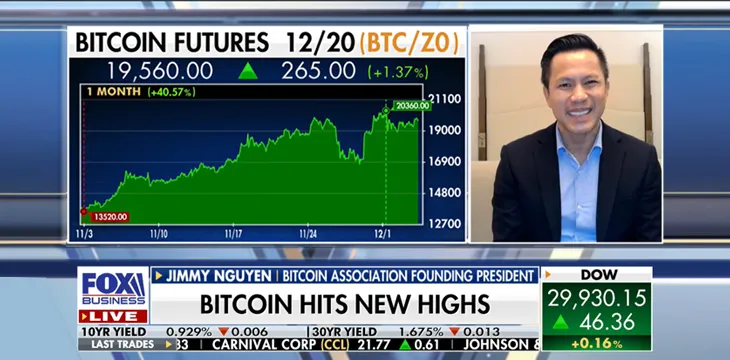|
Getting your Trinity Audio player ready...
|
On November 3rd at around 9:50 a.m. EST, Bitcoin Association Founding President Jimmy Nguyen was a guest on the Fox Business show, Varney & Co. The discussion revolved around the current price of BTC, and whether BTC is more like a currency or store of value like gold is.
#Bitcoin should be used for daily transactions, not as reserve asset (which is fueling BTC's recent price rise). This is exactly why we support #SatoshiVision.
Thanks @Varneyco & @FoxBusiness for having me on the show.https://t.co/bUTFu10dop
— Jimmy Nguyen (@iamJimmyWIN) December 3, 2020
“Bitcoin was born to be a peer-to-peer electronic cash system,” Nguyen said. “Bitcoin was meant to be used in daily life by businesses and consumers all over the world, that’s where it should get its value–with real usage. Unfortunately, that’s not what’s happening, there’s a narrative that it’s a store of value that’s driving up its price.”
The recent rise in the value of a majority of the coins and tokens in the digital currency ecosystem is due to speculation and news headlines. Both institutional and retail investors have been pouring money into the digital currency markets because they saw what happened in 2017, and think that the market is ripe to repeat that price action. Major news publications such as Bloomberg, the Wall Street Journal, and the Financial Times, have been writing stories that indicate that the digital currency markets have a positive future which is creating a bit of a snowball effect in regard to the price increases that we see in the market.
What the recent rise in prices boils down to is speculation; individuals, corporations, and institutions are buying digital currency like BTC because they believe others will buy in after them and that the price will go up—which has been true so far. However, growth that happens by way of speculation is not sustainable.
Follow the whitepaper
BTC fell off track when it diverged from what the Bitcoin whitepaper describes Bitcoin to be and how it operates. BTC is no longer a peer-to-peer electronic cash system because it is more expensive to use BTC in commerce than it is to use fiat currency—the average transaction fee on the BTC network is currently $7.30.
And because BTC has a block size limit of 2 megabytes, it is nearly impossible to build any software of value or include BTC in any tech-stack because it is so restricted.
Seeing the problems that BTC had from both the economic and technical side of operations, Bitcoin SV (BSV) set out to be, and was able to become, the version of Bitcoin that is described in Satoshi Nakamoto’s Bitcoin whitepaper.
BSV can be used for both commerce and engineering because it has transaction fees that are only a fraction of a penny (currently $0.00021) and because it has unbounded scalability which means that there are no data size limits when it comes to storing information in blocks.
That being said, Bitcoin is meant to be a peer-to-peer electronic cash system like the whitepaper describes it to be, but Bitcoin SV is the only version of Bitcoin that can fulfill that goal.
See also: One World, One Chain by Jimmy Nguyen at CoinGeek Live
https://youtu.be/1qzTi6PiM8E

 07-12-2025
07-12-2025 





